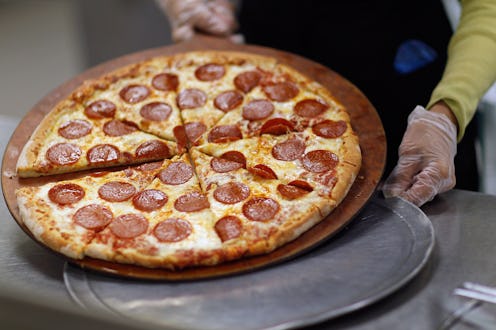News
Hungry? Try The "Random Acts Of Pizza" Subreddit
Researchers at Stanford University have discovered what they consider the perfect way to study altruism: just log onto Reddit! Specifically, the "Random Acts of Pizza" subreddit, in which users ask for someone to order them a pizza, and others come up with the cash, essentially gifting a piping-hot pizza to a complete stranger. The motivation for doing so is a purely simple one: sometimes it's good to give. Which is basically why the researchers have turned to pizza as a measure of altruistic giving.
So how exactly is altruism defined? In short, it's the act of giving or offering something of one's self to another person, without any expectation of reward or benefit, be that direct ("maybe they'll buy me a pizza later!") or indirect ("maybe karma will send me a pizza!"). It's quintessential selflessness, the sort of which author, modern-day libertarian icon and Objectivist philosopher Ayn Rand famously loathed.
There's a reasonable philosophical argument as to whether absolute altruism is even possible — does the warm feeling that an act of charity might bring count as a disqualifying benefit, for example? But as close as we can get to truly assessing it, the "free pizza" subreddit is a gift.
By examining which requests were answered and which weren't, the researchers were able to assemble a pile of data about which words or tacts were most successful at eliciting a random act of pizza. The answer, after analyzing over 5,700 requests? Don't be afraid to be thorough about your plea, as more words leads to greater odds of pizza, and you'll be more likely rewarded if your explanation is a sympathetic one. A story of joblessness, poverty or a hungry family is much more likely to appeal to another person than, "Hey, I was hungry!"
It's not the first time that mass online activity has been studied to gain insight into human altruism. A study into eBay feedback reviews in 2013 found that over 60 percent of buyers leave a rating for their seller, despite the vast majority (95 percent) of those purchases being one-off interactions. Basically, there's no clear incentive to leaving the feedback, as it wastes a few seconds or minutes of a buyer's time, and affords no real benefit.
This "free pizza" analysis, however, trumps that example. After all, a benefit to leaving user feedback does exist — the resulting mass of seller ratings serve as a helpful transaction guideline for everyone. In the case of doling out free pizza, the sacrifice is much greater (actually spending money) and the anticipated personal benefits are nil. Aside from, obviously, that little stirring of satisfaction when you know you've done something nice for someone.
The Stanford team responsible isn't stopping with their altruism inquiries just yet. They're planning to broaden their horizons, also examining online philanthropy website DonorsChoose, which allows people to donate directly to public school teachers' curriculum costs.
Image: Tim Althoff, Danescu-Niculescu-Mizil, Dan Jurafsky/Stanford
